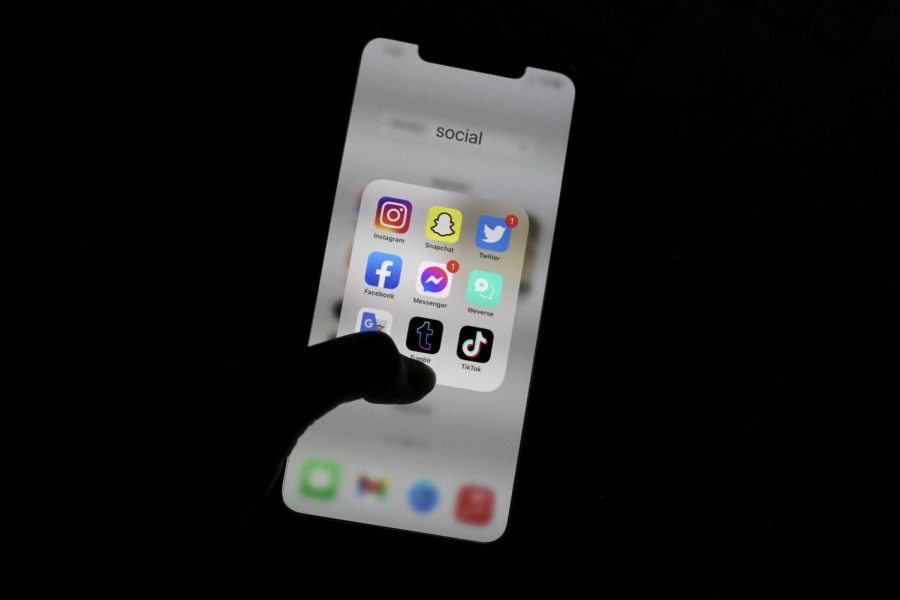Social Media Harms Mental Health
Without a doubt, social media has taken up a large role in consumers’ daily lives. Even if it is unintentional, we might find ourselves scrolling through our Instagram and TikTok feeds without even realizing the hours that passed because of how routine it has become. This also means that we don’t realize when and how social media affects our mental health as daily consumers, and it’s time to talk about it.
In a 2021 report conducted by YPulse, evidence shows that teenagers spend over 4.5 hours a day on social media, compared to millennials who spend about 3.8 hours on social media. It doesn’t seem like there’s much of a difference, right?
Wrong. Even if the 42-minute difference between social media usage seems miniscule, the rise in influencers on social media has influenced teenagers to become dependent on their phones, along with the vast difference of who is influencing Gen Z teenagers compared to millennials.
“Even if you know that images you’re viewing on social media are manipulated, they can still make you feel insecure about how you look or what’s going on in your own life,” HelpGuide said. “Similarly, we’re all aware that other people tend to share just the highlights of their lives, rarely the low points that everyone experiences. But that doesn’t lessen those feelings of envy and dissatisfaction when you’re scrolling through a friend’s airbrushed photos of their tropical beach holiday or reading about their exciting new promotion at work.”
The entire world outside of their phone is no longer in existence the moment the application is launched.
It becomes a cycle. Having a bad day? Go on social media.
Take COVID-19 as an example. The day the state of Virginia was ordered to stay at home for a year and a half, everyone concluded that the first thing to do was go on social media because there wasn’t anything else.
A poll was conducted asking how many hours students spent on social media during quarantine, and the hours ranged from 4-12 hours daily between 18 students.
The effects of social media can be irreversible. Scrolling through redundant posts that cannot be controlled is frightening. When it comes to topics of insecurities such as weight and beauty, these cannot be controlled by other users except for the user that posted it themselves.
This unexpected scenario can bring sentimental feelings about self insecurities back to surface, feeling like they’re unable to love or feel good about themselves because they don’t feel like they’re within unrealistic social media standards.
“Social media that’s humorous or distracting or provides a meaningful connection to peers and a wide social network might even help teens avoid depression,” Mayo Clinic said. “However, social media use can also negatively affect teens, distracting them, disrupting their sleep, and exposing them to bullying, rumor spreading, unrealistic views of other people’s lives and peer pressure.”
Now let’s talk about the lo-and-behold social media platform that popped up in 2019: TikTok. By the way, ‘TiK ToK’ by Ke$ha is better.
Released in 2016, the social media platform did not exist as a popular social media platform until the year 2019. Now, users are constantly on the app whether they’re in class, at work, or procrastinating on homework.
Technically, TikTok is just another version of Vine or Musical.ly. Short videos, lots of lip syncing, and skits that are interesting to say the least.
Influencers like Addison Rae and Charli D’amelio popped up out of nowhere and now they’re walking the Met Gala? In a way, TikTok offers the same opportunity that other social media platforms give to consumers: stardom.
Once a TikTok blows up, the user can gain hundreds of followers at a time, which encourages consumers to constantly be on their phones and take time away from their peers and family.
“450 teens found that greater social media use, nighttime social media use and emotional investment in social media — such as feeling upset when prevented from logging on — were each linked with worse sleep quality and higher levels of anxiety and depression,” an article from Mayo Clinic said.
Similar to other platforms, likes and shares become the main idea. Large influencers end up caring about who likes their post, how many people like it, and become dedicated to gain more followers. Not only is that dangerous, but it becomes exhausting, wanting to do more and more.
Cyberbullying has become a serious issue on the internet. Mentally draining and deteriorating the users online, it has brought the bad sides of social media on the surface.
According to Lifespan, one out of four teens are bullied and up to 43% of those are bullied online. 58% have not told their parents or an adult about something mean or hurtful that happened to them and 5.4 million children stay home because they fear being bullied.
With the harmful effects of social media on mental health, we continue to use it anyway. Even knowing how bad we are glued to our phone screens, it can still be difficult to pry ourselves away from it. Truthfully, there may be no remedy for this, but we are the ones in control. Let’s be nice to each other, especially to ourselves.



